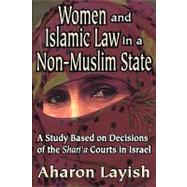
Note: Supplemental materials are not guaranteed with Rental or Used book purchases.
Purchase Benefits
Looking to rent a book? Rent Women and Islamic Law in a Non-Muslim State: A Study Based on Decisions of the Shari'a Courts in Israel [ISBN: 9781412805841] for the semester, quarter, and short term or search our site for other textbooks by Layish,Ahron. Renting a textbook can save you up to 90% from the cost of buying.
| FOREWORD | xiii | ||||
| PREFACE | xv | ||||
| INTRODUCTION | 1 | (13) | |||
| Chapter One. AGE OF MARRIAGE | |||||
|
14 | (2) | |||
|
16 | (6) | |||
|
22 | (2) | |||
|
24 | (6) | |||
| Chapter Two. STIPULATIONS INSERTED IN CONTRACTS OF MARRIAGE | |||||
|
30 | (1) | |||
|
31 | (3) | |||
|
34 | (6) | |||
| chapter Three. DOWER | |||||
|
40 | (1) | |||
|
41 | (10) | |||
|
51 | (5) | |||
|
56 | (4) | |||
|
60 | (12) | |||
| Chapter Four. POLYGAMY | |||||
|
72 | (2) | |||
|
74 | (4) | |||
|
78 | (2) | |||
|
80 | (11) | |||
| Chapter Five. MAINTENANCE AND OBEDIENCE | |||||
|
91 | (1) | |||
|
92 | (9) | |||
|
101 | (3) | |||
|
104 | (2) | |||
|
106 | (19) | |||
| Chapter Six. DIVORCE | |||||
|
125 | (7) | |||
|
132 | (21) | |||
|
132 | (3) | |||
|
135 | (7) | |||
|
142 | (11) | |||
|
143 | (8) | |||
|
151 | (1) | |||
|
152 | (1) | |||
|
153 | (20) | |||
|
153 | (10) | |||
|
153 | (3) | |||
|
156 | (2) | |||
|
158 | (1) | |||
|
158 | (1) | |||
|
159 | (4) | |||
|
163 | (10) | |||
|
163 | (1) | |||
|
164 | (1) | |||
|
164 | (1) | |||
|
165 | (3) | |||
|
168 | (3) | |||
|
171 | (1) | |||
|
172 | (1) | |||
|
173 | (5) | |||
|
173 | (4) | |||
|
177 | (1) | |||
|
178 | (2) | |||
|
180 | (66) | |||
|
180 | (1) | |||
|
181 | (5) | |||
|
181 | (3) | |||
|
184 | (2) | |||
|
186 | (1) | |||
|
186 | (11) | |||
|
186 | (1) | |||
|
187 | (2) | |||
|
189 | (2) | |||
|
191 | (4) | |||
|
195 | (2) | |||
|
197 | (13) | |||
|
197 | (1) | |||
|
197 | (1) | |||
|
198 | (1) | |||
|
198 | (12) | |||
|
199 | (1) | |||
|
200 | (6) | |||
|
206 | (3) | |||
|
209 | (1) | |||
|
209 | (1) | |||
|
210 | (80) | |||
|
210 | (2) | |||
|
212 | ||||
| Chapter Seven. CUSTODY | |||||
|
246 | (1) | |||
|
247 | (3) | |||
|
250 | (2) | |||
|
252 | (11) | |||
| Chapter Eight. GUARDIANSHIP | |||||
|
263 | (2) | |||
|
265 | (3) | |||
|
268 | (3) | |||
|
271 | (8) | |||
| Chapter Nine. SUCCESSION | |||||
|
279 | (3) | |||
|
282 | (4) | |||
|
286 | (4) | |||
|
290 | (11) | |||
|
290 | (2) | |||
|
292 | (3) | |||
|
295 | (1) | |||
|
296 | (2) | |||
|
298 | (1) | |||
|
299 | (1) | |||
|
300 | (1) | |||
|
301 | (6) | |||
|
307 | (20) | |||
| SUMMARY | 327 | (12) | |||
| SOURCES AND BIBLIOGRAPHY | |||||
|
339 | (1) | |||
|
339 | (1) | |||
|
340 | (1) | |||
|
340 | (1) | |||
|
340 | (1) | |||
|
340 | (1) | |||
|
340 | (2) | |||
|
342 | (1) | |||
|
342 | (1) | |||
|
343 | (1) | |||
|
344 | (5) | |||
|
349 | (2) | |||
| GENERAL INDEX | 351 | (14) | |||
| GLOSSARY OF ARABIC TECHNICAL TERMS | 365 |
The New copy of this book will include any supplemental materials advertised. Please check the title of the book to determine if it should include any access cards, study guides, lab manuals, CDs, etc.
The Used, Rental and eBook copies of this book are not guaranteed to include any supplemental materials. Typically, only the book itself is included. This is true even if the title states it includes any access cards, study guides, lab manuals, CDs, etc.